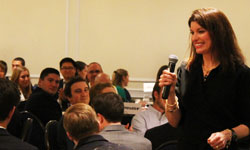Careers get real in D.C.
Sixty-two undergrads with 19 different academic majors traveled to Washington this summer to explore what it’s like to live and work in the District of Columbia.
From freshmen to seniors, students learned about the ins and outs of careers in banking, politics, real estate and more from 40 Wake Forest alumni who’ve settled in the nation’s capital.
“I made a number of valuable connections that I am excited about for the future,” said junior history major Andy Heckler. “My conversations gave me an insight into different jobs that I may be interested in like finance or consulting.”
Counseling professor Heidi Robinson, who teaches for-credit personal and career development courses at Wake Forest, says students have a hunger for real career information. “Some seem to know exactly what they want to do after they graduate, but at this kind of event, they begin to recognize the vastness of their opportunities.”
Careers in the Capital: Students share what they learned in D.C.
For those who are unsure what direction their journey should take after college, there is often anxiety around answering the question, “what do you want to do when you graduate?”
Juniors and seniors in particular can become distracted by the idea that networking events should lead to immediate job and internship offers, but the coaching team in career development emphasizes the goal for these kinds of events is to leave behind a positive footprint.
“Students need to be prepared to confidently and effectively answer the question, ‘what are you interested in,’” says Robinson. “When you’re a student, there’s more forgiveness around not having all the answers. What’s important is being genuine. The person asking the question is often looking for a hook on which they can hang help.”
Preparing to ‘network’
It is difficult to pinpoint exactly how many jobs are secured through networking, but estimates suggest the number may be as high as 70 to 80 percent, so knowing how to build strong connections is critical.
Networking is about a give and take between individuals with common interests. At D.C. Connects, alumni offer their time, their career-launch feedback and insider tips. What do students give? They create a bridge back to the University by sharing all the new happenings on campus and in Winston-Salem.
“Talking with alumni about their career goals and interests helps students practice their communication skills in a safe environment, says Associate Vice President, Career Development and Corporate Programs Mercy Eyadiel. They are networking with people who really care about Wake Forest and are interested and invested in student success. Practicing in this environment makes it easier to network at campus recruiting events and in the real world.”
Still, networking at a formal event means putting on professional clothing, wearing nametags and bringing your “A” game. Stepping into this unfamiliar world can be unnerving. How can students be sure to walk away with contacts they can continue to develop?
“I tell students to get as many business cards as they can,” says Robinson. “On the back of those cards, they should jot down a few details about the person they talked with and their conversation.” These details, which often slip quickly from memory once the excitement of the event is over, help with crafting a thank you note or preparing for a follow-up call.
Getting to action
Whether they’ve just completed their first year or started their last, students who attend D.C. Connects return to campus more focused.
Wake Forest’s liberal arts curriculum ensures that all students get broad exposure to a wide range of disciplines — offering opportunities and flexibility that can seem both exciting and daunting.
“There are many choices in college about where to invest your time — understanding what skills are most desired for a particular field of interest, whether these are organizational, interpersonal or technical, for example, can help students make more intentional decisions,” says Robinson.
“As a student, I knew what academic subjects interested me but I had no idea how to translate that into a career,” says Ryan Ramsey, a 2003 D.C. Connects alumnus who works as Chief of Staff in the Office of Legislative Affairs at the Department of Homeland Security. “I’m honored to play a small role in helping students transition into professionals.”
A $1.5 million grant from the Kirby Foundation has enabled more opportunities for students to be able to attend Wake Forest career networking events. The funds help with experiential learning and professional development expenses.
Categories: Alumni, Mentorship, Personal & Career Development
Media Contact
Wake Forest News
media@wfu.edu
336.758.5237




